A huge congratulations to our unstoppable class of 2024, formerly the class of 2020, aka, the covid class, for making it through…and finishing with flying colors!! Bella Barocas, Mira Begg, Dylan Campos, Ishani Dave, Ella Doherty, Sloane Dzhitenov, Lia Franklin, Madeline Frew, Danielle Garten, Andie Glanzer, Debbra Goh, Madisyn Gomez, Marangela James, Sachita Jariwala, Joshua Kleiman, Kiran Kling, Paul Kraut, Jasmine Lam, Amara Leazer, Serena Levingston, Alberto Lopez, Jessica Luu, Cam McCrystal, Maggie Monaghan, Nerdvens Moreau, Amanda Morris, Meera Nemali, Advait Prasad, Lea Schaffer, Amy Smith, Cole Torino and Katie Yin. Watch the video below to meet our entire class of 2024 — and click on the links in this paragraph, to read more about so many of those amazing new alums!
villegas ’21 pursues interest in enviro justice
Jolie Villegas ’21 grew up in San Francisco and majored in environmental studies and biology at Wes. After receiving her master’s degree at Columbia, she became a clean power analyst at the Environmental Defense Fund. Today, she is an analyst at the World Resources Institute.

How did you develop an interest in studying and working in the environment? How did your experience at Wesleyan influence your decision to work in this industry?
I was born and raised in San Francisco, California, which is a very green and environmentally focused city. It’s easy to adapt individual sustainable behavior practices when you’re surrounded by a community of like-minded people.
I initially thought about environmentalism as an individual issue, caused by consumerism and waste. Then, through my classes at Wes, I got a much more holistic picture of climate change and all of the anthropogenic actions that are contributing to inequitable climate impact. I shifted my field of study from the conservation side, into climate and environmental justice.
planet vs. plastic
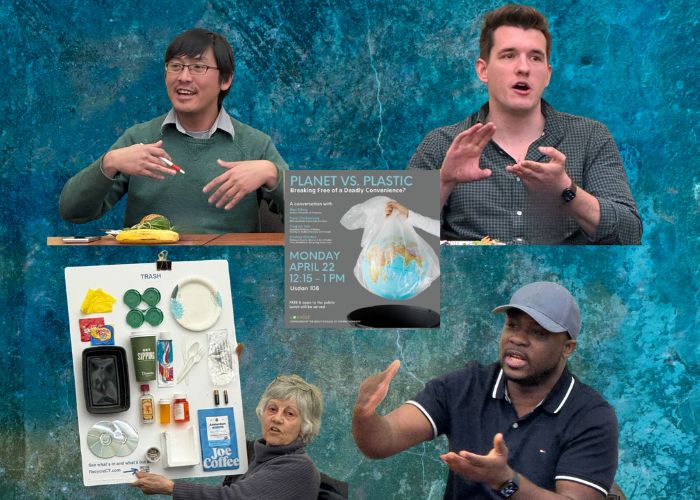
On a significant day for environmental awareness—Earth Day, April 22—I found myself seated in Usdan 108, engrossed in a compelling panel entitled, “Planet vs. Plastic: Breaking Free of a Deadly Convenience?” The event, hosted by the Bailey College of Environment, featured a panel of Wesleyan faculty and community members dedicated to unraveling the complexities of plastic pollution and its ramifications on our planet. As I reflect on the insights shared during the event, I realize the urgency of addressing this global crisis and the imperative need for collective action.
meet our bailey coe 2024 summer fellows!
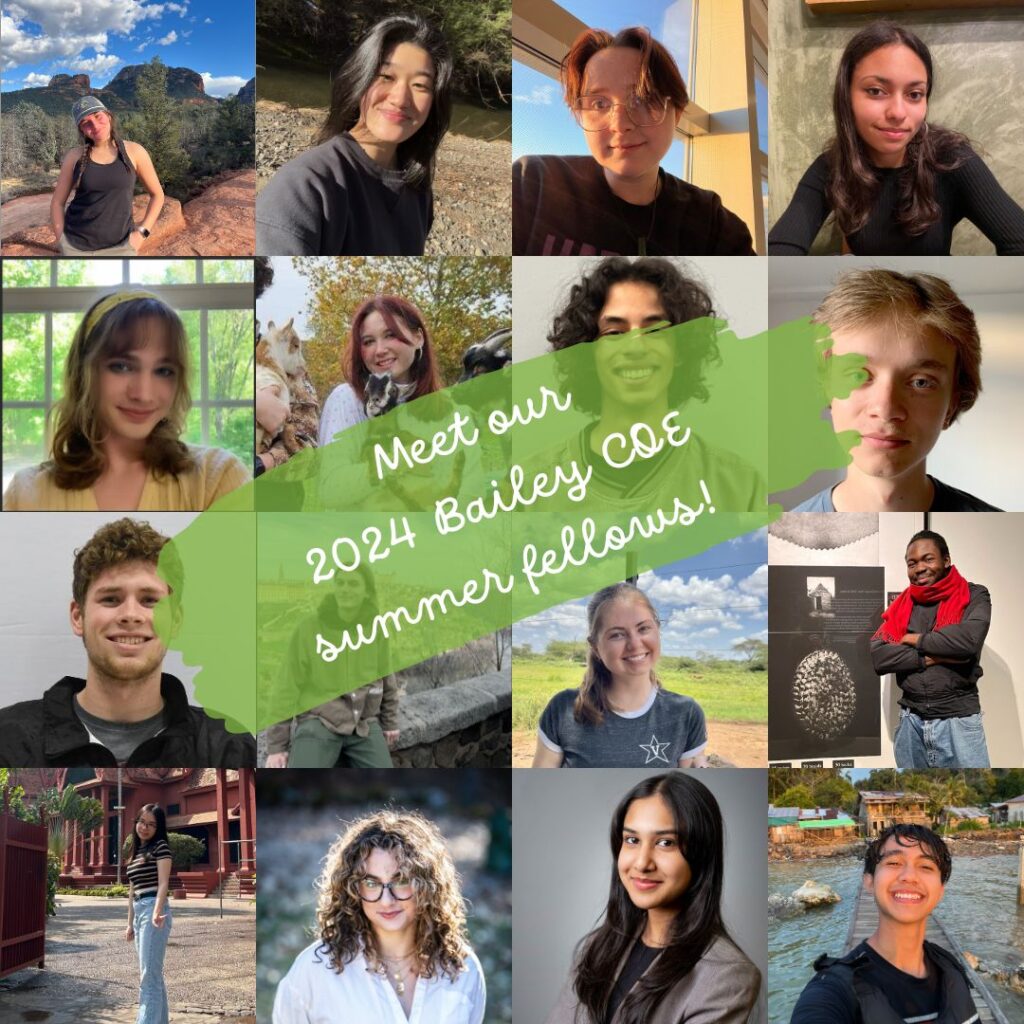
Every year, the Bailey COE awards fellowships to fund summer (and spring and fall) research opportunities for Wesleyan students across all majors and class years. Most recently, the Bailey COE awarded almost 40 fellowships to Wes students. Learn a little bit more about each, below! Applications for summer 2024, fall 2024 and spring 2025 Bailey COE fellowships will open in January 2024.
Ava Guralnick ‘25 plans to use personal storytelling narratives to combine the perspectives of Asian American Studies and Environmental Studies. She will examine the ways in which various spatial and temporal geographies of land can provide new ways to understand and locate the interwoven histories of imperial conflict, connection, and new kinship/family making processes.
senior spotlight: kiran kling ’24
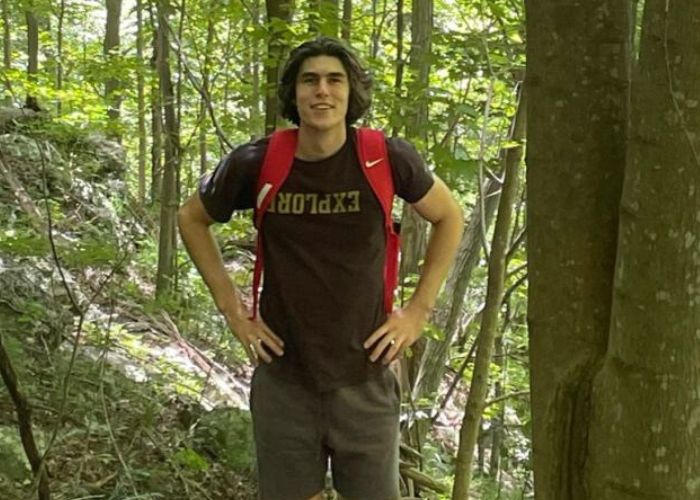
How did you first become interested in the environment?
I started thinking and asking and learning about different ways to deal with climate change when I was really young. I used to have a plan to build an electric car company, and I would drag my parents to conferences on renewable energy. I was very concerned that there was this problem, and nobody was paying attention, and felt like somebody had to do something about it. I thought that I would try and play as much of a role as I could. When I finally had the freedom to study climate solutions in college I jumped at the chance.
What led you to choose your majors, environmental studies and government?
When I got to Wesleyan I decided that I really loved the environmental studies major, and I didn’t want to be boxed into taking the entire earth and environmental science curriculum, particularly online during covid. I liked the variety within the environmental studies major, and I really liked learning about policy, which led me to pursue the government major as well. I chose Wesleyan in large part because of our open curriculum and academic flexibility. I’ve been lucky to take fantastic IDEAS, biology, E&ES, and religion classes alongside my major coursework.
senior spotlight: lea schaffer ’24
What majors or minors did you combine with environmental studies?
I’m a biology and environmental studies major.
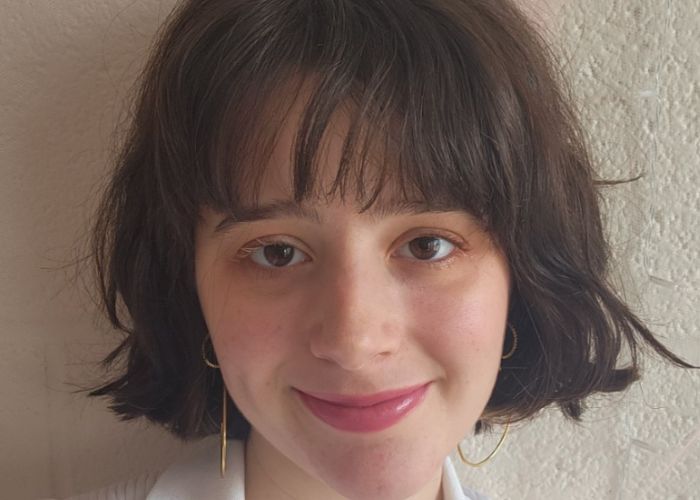
Why did you decide to become an environmental studies major?
I actually transferred to Wesleyan University for my junior year. Part of what interested me in transferring is that I was coming from a school that was just doing hard sciences and biology. I wanted to get a better understanding of its applications in the world, and I thought the environmental studies program was a very good way for me to see, especially in terms of sustainability, the impacts and the larger picture.
Can you tell me about your senior project?
I’m doing an essay that has to do with wastewater management and climate change. So, what is wastewater management? How does it function? And what are the problems with it? And how does climate change exacerbate it?
Why did you choose that topic?We have these family friends that my dad has worked with that has this really cool company called Clean Two that does septic tanks that have a process to denitrify the waste. So I learned all about why it was needed. It was placed near Cape Cod in Massachusetts, where they have a huge nitrogen problem in the water and all of it comes from wastewater. It’s kind of a solution to that. That got me interested in wastewater in general, and kind of understanding how climate change makes things more important in that matter.
senior spotlight: amara leazer ’24

What are your combined majors/minors?
My primary major is a university major for environmental and ecological design and engineering. It’s linked with environmental studies and I have a minor in IDEAS.
Can you tell me about your university major? How you created it, what drew you to it, and what it consists of?
I was originally in earth and environmental science. I liked it but some of the requirements were just not going to be helpful for what I wanted to do, and I wouldn’t be able to take other classes that would be more helpful. IDEAS wasn’t a major yet—now, it’s the College of Design and Engineering Studies. So, there was no major that let you build stuff, and I wanted to build stuff. That’s why I made the university major. It’s been super fun and I haven’t had to take too many classes that I don’t want to, so I recommend it.
zaks ’99 relishes role in enviro communications
Laura Zaks ’99 is an international food security specialist with expertise in the intersection of agriculture, climate, economic development, nutrition, and public health. She is the associate director of communications and development for the National Sustainable Agriculture Coalition in Washington, DC.
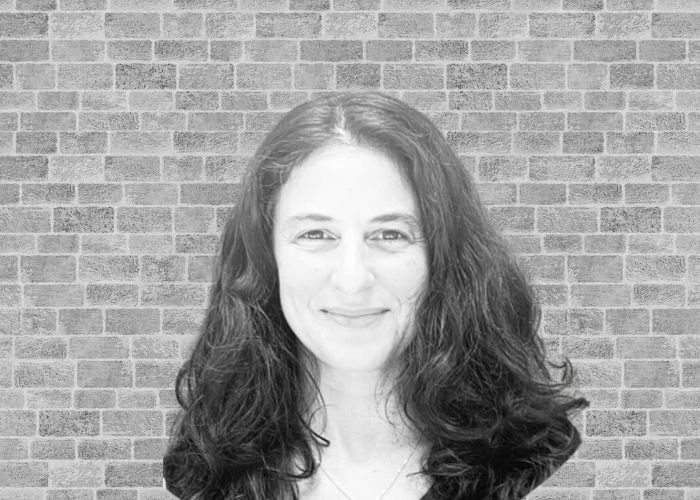
Hello Laura! Would you tell me about your path into working in food security?
It’s been a long journey, when I was at Wesleyan I didn’t know that I wanted to work in food security. I was more interested in broader issues surrounding economic development and community development, but wasn’t really sure how I would work in that space.
I had a period of trial and error. I was actually a College of Letters major and was originally focused on humanities. I really loved history and thought about law school, but because I had studied languages, I was also interested in working abroad. I ended up traveling to Panama, and working there for two years.
senior spotlight: amy smith ’24
Hey, Amy! What majors or minors did you decide to link with environmental studies during your time here?
I’m majoring in environmental studies and biology, and minoring in IDEAS.
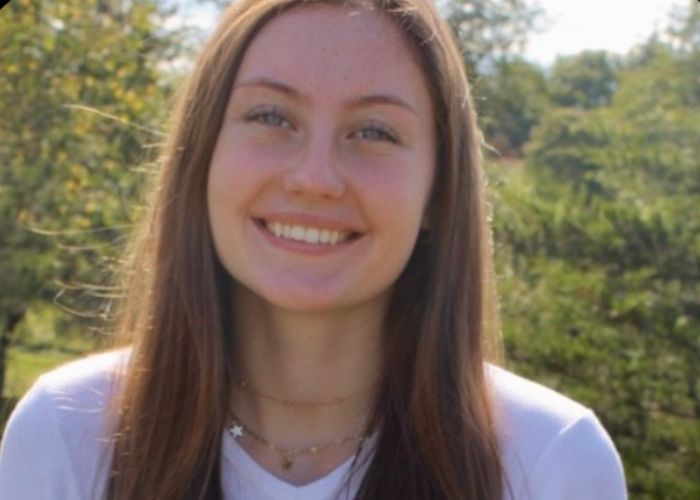
What drew you to those majors?
I came into college, knowing that I wanted to study biology. I grew up on a farm in a pretty rural area, so I always had a strong connection with nature. That’s the same thing that drew me to environmental studies. In terms of IDEAS, I took a mechanical design class my first semester of college, and just like really loved the creative aspect of it. Being able to do hands-on work, as opposed to a lot of my bio classes at that time that were just purely lecture based classes. I really liked the interactive aspect of it.
So what did you do for your senior project?
I did a thesis, I worked with a lab at UMass Boston that I interned with last summer. The lab is focused on marine ecology. The project was looking at how different environmental changes are impacting kelp populations and we found that nitrate concentrations and sea surface temperature are primary environmental drivers of kelp population decline in the northwestern Atlantic. So on the coast of Connecticut, Boston, and up towards Nova Scotia.
senior spotlight: mira begg ’24
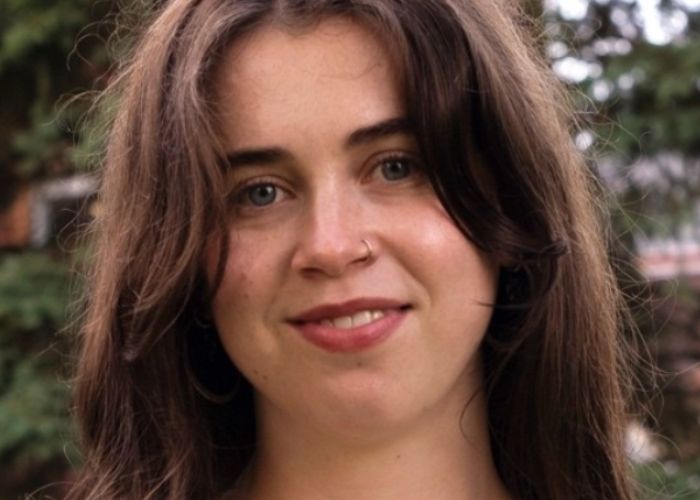
Hi Mira! Where are you from, and what led you to major in environmental etudies?
I’m from Lake Tahoe, California. I’m studying economics and environmental studies. I grew up in an outdoor place, and because of this I’ve inherently been interested and connected to the outdoors throughout my life. When I got to college, I didn’t think I wanted to major in environmental studies at all, but then I took a class called Dynamic Earth, and realized that I actually really did want to pursue the maor. I’ve changed directions completely, which I’m very happy about. I’m much more interested in this major combination than only majoring in economics.
What are some of your favorite classes?
My favorite class was Renewable Energy and Negative Emissions Technologies with Professor Rosemary Ostfeld. I enjoyed it primarily because I’m really interested in clean energy, the tech startup industry, and carbon sequestration. I like following the new ideas that come from those fields.
senior spotlight: andie glanzer ’24

Hello! How did you decide to major in environmental studies, and what has your experience been as a part of the Bailey COE?
I’m Andie. I am a government and environmental studies major from Long Island, New York. I’ve always had a passion for the environment and nature. In high school, I was really interested in protecting against climate change, so naturally I was drawn to the environmental studies linked major at Wesleyan. When I was in highs chool, I was mostly involved with science research, but I didn’t enjoy it. I was happy that at Wesleyan I could pursue my passion for sustainability while learning about policy and politics related to the environment.
The government and environmental studies combination works well, because as an environmental studies major you learn about major climate problems and solutions, and then the government gives you the tools to implement change. You learn how governments function and how regulatory processes work, and you begin to see that the way people perceive an issue shapes political responses to problems.
What classes have you enjoyed during your time at Wesleyan?
One class I enjoyed was the Environmental Law and Politics class with Professor Earl Phillip. It was probably the most difficult class I’ve taken at Wesleyan, but it was also one of the most rewarding. It introduced me to environmental law and regulations, which is something that I’m interested in pursuing in the future.
senior spotlight: katie yin ’24
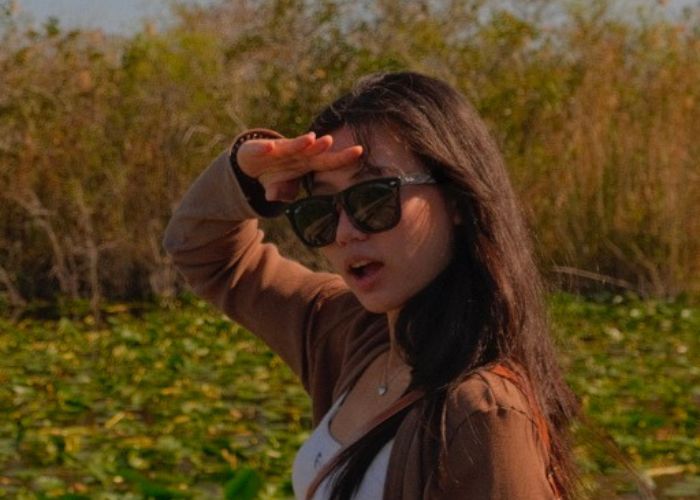
Hi, Katie! What are your majors and how have you combined them here at Wes?
My double major is economics and environmental studies. My interest in environmental studies started because I grew up in China during the time when pollution was much worse than it is today. I really wanted to do something about it, so that got me interested in my high school’s environmental organizations. And that interest continued in college. Then, later on, I chose to major in economics because I learned about the carbon cap and trade systems and the carbon tax. And I feel that if we want to solve our environmental issues, we need to look out how they’re intertwined with our economic system.
senior spotlight: bella barocas ’24
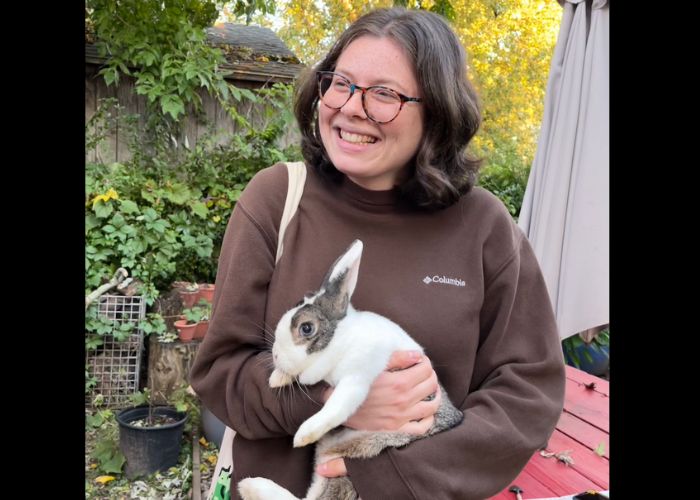
Hi, Bella! Would you tell me a bit about yourself, and how you found your way to Wesleyan?
I grew up in Nashville, Tennessee, and I transferred to Wesleyan in my sophomore year, when I realized I didn’t want to be in a big city for college. I actually worked with Lisa Stein ‘21 at an overnight camp the summer after I graduated high school, so Wesleyan was on my radar when I decided to transfer.
How did you become interested in the environment?
In my family we spent a lot of time outside, taking hikes and doing other activities, so I was always somewhat interested in the environment. I also did a semester school program when I was in high school. The program is called The Outdoor Academy in Pisgah Forest, Western North Carolina. I particularly became interested in waste systems. We took a trip to a landfill for the program, and I had never seen where my trash was going, and it really stuck with me. Then I went back to high school and I became the president of the environmental club and started getting compost in the school cafeteria. And then I came here to Wesleyan and realized that the compost interns were the coolest people in the Sustainability Office—you can quote me saying that!
campos ’24 awarded watson fellowship

The Thomas J. Watson fellowship is a one-year grant for purposeful, independent exploration outside the United States, awarded to graduating seniors nominated by one of 41 colleges, including Wesleyan University. The Watson Fellowship allows fellows to engage with their deepest interest on a global scale. Fellows create and develop original projects and embark on the journey for a year. Fellows decide where to go, who to meet, and when to change course. The program aims to produce a year of personal insight, perspective, and confidence that shapes the arc of fellows’ lives. Each year Wesleyan may nominate four candidates. History and environmental studies major Dylan Campos ’24 is one of this year’s Watson fellowship awardees.
Hi, Dylan! Can you tell me a bit about yourself ––what you’re studying, where you’re from, and how you became interested in environmental studies?
Hi! My name is Dylan Campos, I use he/they pronouns, and I’m a senior studying history and environmental studies with a minor in global engagement. I’m from Branford, Connecticut, so not terribly far, maybe 40 minutes, and I’m actually a transfer student. I was originally at Hampshire College in Amherst, Massachusetts. As a class of ’24 person––a high school class of 2020 person–– COVID did so many things matriculating into college, and so I ended up here my sophomore year. I always knew I was interested in the environment, I just didn’t know exactly how or what. In high school I was really into water and coastal work, living in a shoreline town, and actually it wasn’t until I was at Hampshire that my interests pivoted towards agriculture. And then here at Wesleyan it’s narrowed towards food and food politics, food security, and that’s where I am now.
senior spotlight: meera nemali ’24
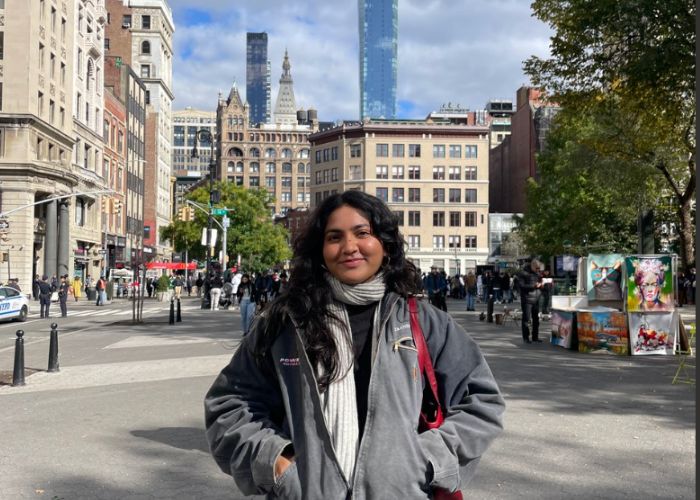
What are your majors?
I am an environmental studies and anthropology major.
Tell us about your capstone project!
I did my capstone paper last semester through an anthropology class called From Metropolis to Megalopolis (ANTH249). I wrote my capstone about how urban planning and city infrastructure can worsen environmental disasters and the ways in which we can sustainably plan our cities in the future. I don’t really know if there’s a way to prevent these disasters, but there are ways to prevent further damage in cities.
senior spotlight: sloane dzhitenov ’24
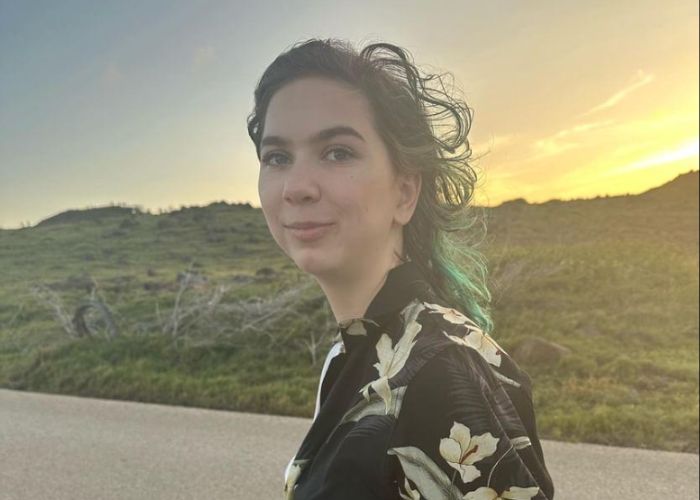
Hi, Sloane! What are your majors and where are you from?
I’m a triple major, which is crazy. I’m a film and environmental studies major and also an economic major. And I’m from Massachusetts.
Outside of academics, what else are you involved in on campus?
Film takes up most of my free time. I try to make as many movies as I can. I also run Intercut, which is the film and TV magazine on campus. Those are honestly my main extracurriculars at the end of the day
senior spotlight: serena levingston ’24
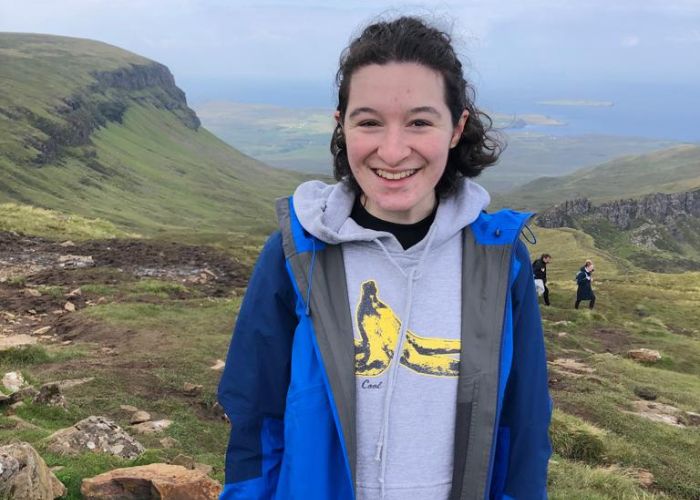
Hi, Serena! What are your majors here at Wes?
My majors are environmental studies and feminist, gender, and sexuality studies.
What sort of intersection have you found between those two majors?
I think there’s the ecofeminism aspect, looking at how the ways people treat earth seem to mirror the ways people treat women and marginalized people. I’ve taken a lot of classes that focus on the effects of colonialism and western imperial thought on the earth and people.
What are you doing for your senior project?
I wrote a capstone essay last semester in the FGSS Department that was focused on endocrine disruptors, which are a class of chemical compounds that includes things like BPA and parabens. I wrote about how such things are talked about in mainstream media narratives, what that shows about cultural fears, and how that can be applied to broader rhetoric around environmental effects. So, for example, there’s a lot of panic around the effects of endocrine disruptors on reproduction. So I looked at things like who is panicking and who does it actually affect? And I found that the people who are panicking are not necessarily the ones who are affected by it.
senior spotlight: danielle garten ’24
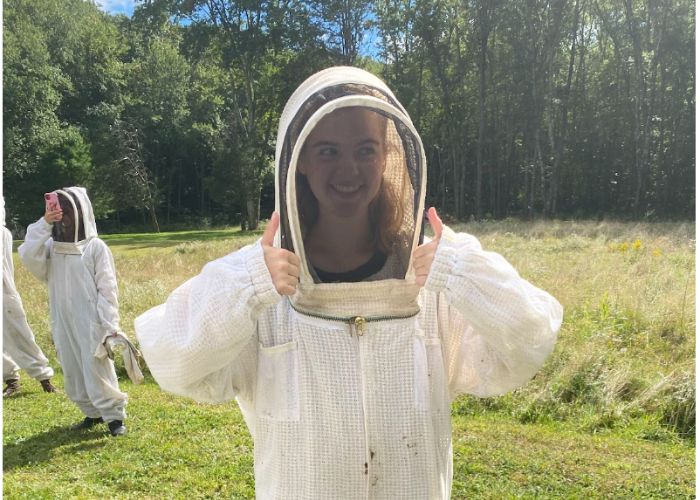
Hello! Would you share a bit about your background, and how you became interested in studying the environment?
Hi, I’m Danielle, and I use she/her pronouns. I’m from Baltimore, Maryland. I’m studying psychology, education, and environmental studies. I first became interested in the environment when I took AP Environmental Science as a senior in high school. I found the class so interesting, especially learning about population density and how it relates to sustainability and environmental justice. I think that unit helped me understand that social science is connected to environmental science, and it made me want to do environmental studies at Wesleyan.
senior spotlight: marangela james ’24

Our 33 class of 2024 ENVS linked majors have primary majors in 15 different departments, from film to government to feminist, gender and sexuality to chemistry. This diversity reflects the deep and widespread interest in environmental issues on the Wesleyan campus and our incredibly fertile coexist community! Manangela James ’24 is a philosophy and environmental studies major who works at Olin Library and as a financial manager for the Green Fund. Learn more about Marangela, below!
senior spotlight: ishani dave ’24
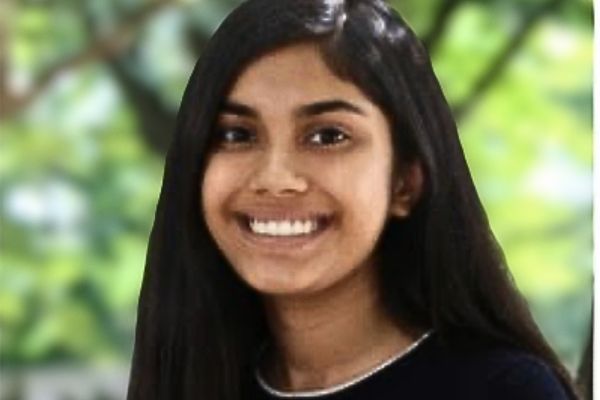
Our 33 class of 2024 ENVS linked majors have primary majors in 15 different departments, from film to government to feminist, gender and sexuality to chemistry. This diversity reflects the deep and widespread interest in environmental issues on the Wesleyan campus and our incredibly fertile coexist community! Ishani Dave ’24 is an economics and environmental studies major from New Jersey who works in the Office of Sustainability. Learn more about Ishani, below!
senior spotlight: alberto lopez ’24

Our 33 class of 2024 ENVS linked majors have primary majors in 15 different departments, from film to government to feminist, gender and sexuality to chemistry. This diversity reflects the deep and widespread interest in environmental issues on the Wesleyan campus and our incredibly fertile coexist community! Alberto Lopez ’24 is a government and environmental studies major from Texas. Learn more about Alberto, below!
mcmahon ’24 studies tritrophic interactions in singer lab
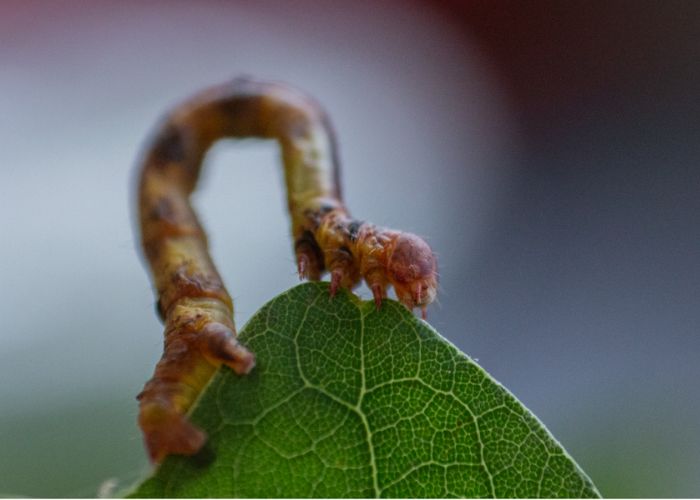
Every year, the Bailey COE awards fellowships to fund summer, fall and spring research opportunities for Wesleyan students across all majors and class years. Biology major and environmental studies and Jewish studies minor Ben McMahon ‘24 spent his summer examining the tritrophic interactions involving white oak, phloem feeding insects, caterpillars and ants, and the ecological impact the different trophic levels have on one another.
sussman squires ’21 explores energy policy at columbia
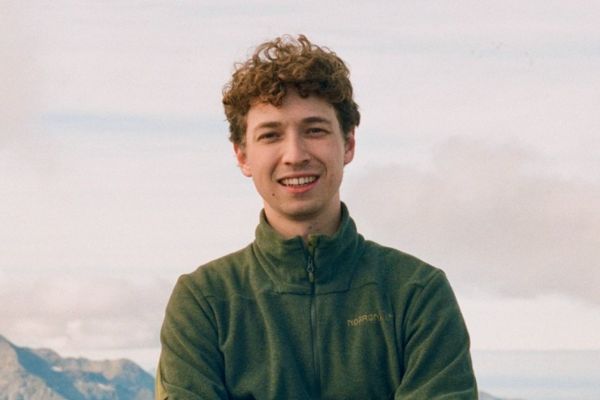
Grayson Sussman Squires ’21 graduated from Wes with majors in environmental studies and CSS. He is currently attending Columbia’s Climate School. More about his post-Wes journey, below!
neiblum ’26 spends summer surveying seabirds in alaska

Every year, the Bailey COE awards fellowships to fund summer research opportunities for Wesleyan students across all majors and class years. Most recently, the COE awarded more than 40 fellowships to Wes students. Sophia Neiblum ’26 is an E&ES and biology major who worked at the Alaska SeaLife Center in Seward, Alaska, as a seabird research intern last summer.
For my summer fellowship, I worked at the Alaska SeaLife Center (ASLC) as a seabird research intern. The ASLC is a marine research center, public aquarium, and rescue and rehabilitation center in Seward, Alaska. Home to the Kenai Fjords national park, Seward hosts an incredible diversity of marine life. I interned in the ASLC’s seabird research lab, led by Dr. Tuula Hollmen from the University of Alaska Fairbanks.
senior spotlight: amanda morris ’24
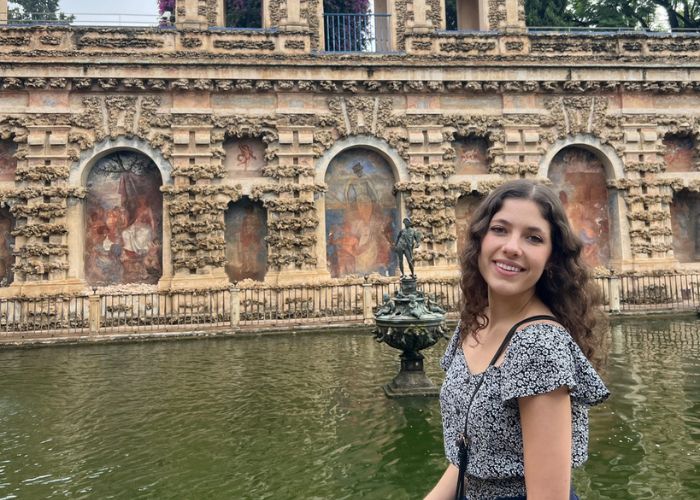
My experiences as an environmental studies major at Wesleyan have broadened my horizons and opened me to an expansive range of new perspectives. I have had many wonderful opportunities throughout my time at Wesleyan and am grateful to have had the support of a number of faculty mentors. I have especially appreciated the interdisciplinary nature of my environmental studies major and have found that the coursework combines well with my government major and international relations concentration.
o’connor ’26 focuses on bats for new doc

Every year, the Bailey COE awards fellowships to fund summer research opportunities for Wesleyan students across all majors and class years. Most recently, the Bailey COE awarded more than 40 fellowships to Wes students. Zack O’Connor ‘26 is a prospective film and environmental studies double major. For his summer project funded by the Bailey COE, he produced a documentary about white nose syndrome, a devastating fungal disease that has had a catastrophic impact on bat populations across North America. Zack’s film focuses on how white nose syndrome has impacted bats on Martha’s Vineyard.
senior spotlight: debbra goh ’24
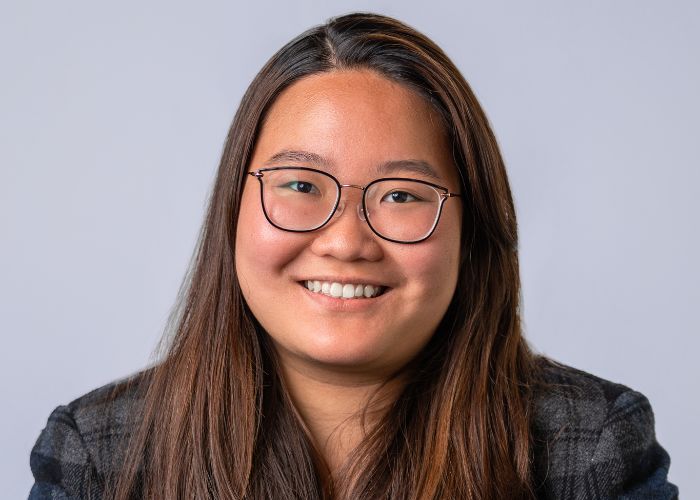
Debbra Goh ‘24 is an environmental studies and region major. She is a Bailey College of the Environment summer fellowship recipient and has utilized this support to work on her senior thesis, which will examine the Orang Laut community in Singapore and national narratives of development. She is also a Bailey COE Think Tank fellow, a member of the Wesleyan Green Fund, and cofounder of WesThrift, Wesleyan’s free thrift store.
podol ’25 finds inspiration connecting to the land

Every year, the Bailey COE awards fellowships to fund summer research opportunities for Wesleyan students across all majors and class years. Most recently, the COE awarded more than 40 fellowships to Wes students. Hanah Podol ‘25 is an environmental studies and anthropology major. For her summer project funded by the Bailey COE, she connected with the land through farming and writing.
senior spotlight: lia franklin ’24
Hi, lovely coexist blog readers! My name is Lia Franklin and I have been an intern for the Bailey COE for the past two years. I have been so lucky to work with the wonderful Laurie Kenney to write some great blog posts, create content, and help with events. I have been so grateful for the opportunity to get to know the Bailey COE community more; from students to professors to outside speakers. So, now it’s time for you all to get to know me a little better!

I was born and raised in Brooklyn, New York, but have always had a love for the outdoors. This dual love, which many think is somewhat contradictory, has driven my interest in climate change and environmental issues.
Here at Wesleyan, I am a second semester senior and a government and environmental studies major. I am currently writing a thesis about environmental constitutionalism using New York State as a case study. Through this project, I have been able to combine my two passions: political science and climate work. After graduation, I hope to continue pursuing this combination and am interested in one day working in environmental public policy. I’m specifically interested in urban policy and the intersection between environmental justice movements, public policy, and environmental law in urban areas.
brown ’22 shares travel-volunteer experience and advice

Belle Brown ‘22, an environmental studies and government major while at Wes, shares her Workaway experiences in Goa, India, and the Western Ghat mountains, working in permaculture and eco-building; discusses her time at Wesleyan and her late night talk show thesis, Wesleyan Tonight; and shares advice for current Wesleyan students!
Hi, Belle! Would you mind sharing a bit about yourself and your time at Wesleyan?
Hi! I am from Arlington, Virginia, but was raised in Jakarta, Indonesia. I graduated from Wes in 2022, with degrees in environmental studies and government. While at Wes, I was involved in the comedy groups Hysterics and Awkward Silence. For my capstone I created a late night TV show called Wesleyan Tonight, which continued on for a year after I left! I worked at Long Lane Farm, and for Wesleyan Food Rescue, as well as on some senior film theses. I was also a compost intern and got to collect people’s food waste and educate them on composting. That was one of my favorite jobs; it really sparked my current interest in food justice and sustainable agriculture.
senior spotlight: maggie monaghan ’24

Maggie Monaghan’24, is an American studies and environmental studies major and an electee of Wesleyan’s Gamma Chapter of Phi Beta Kappa. Maggie is developing a thesis on the influence of naturalist and writer Alexander von Humboldt, and how language plays a central role in the development of culture and our conceptions of history. As a recipient of a Bailey College of the Environment summer fellowship she had the opportunity to work on a musical about Alexander von Humboldt, set in the modern day.
weiner ’24 explores 1947 texas city disaster
Arlo Weiner ‘24 is a history and Middle East studies major. For his thesis, he is creating a documentary about the 1947 Texas City Disaster in which 576 people were killed and more than 3,000 injured. With the assistance of a 2023 Bailey COE summer fellowship, he spent his summer in Texas City and Galveston, meeting with witnesses of the disaster and conducting historical research.
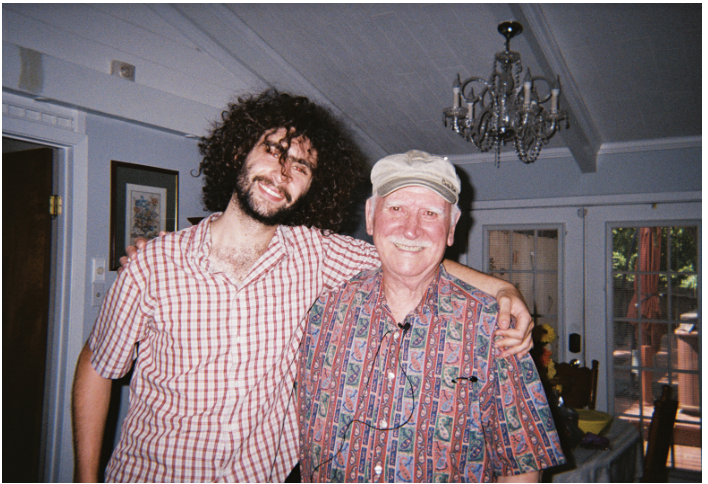
What led you to choose the Texas City Disaster as the subject for this documentary project?
I picked this project because I was able to get in touch with a man named Carl Trepagnier, who wrote a fictionalized account of his experience of the disaster entitled Rise Up: A Novel about the 1947 Texas City Explosion. He offered to bring me to the town and offered to show me around and introduce me to other people who also lived through the disaster.
andrews ’24 retraces her great-grandfather’s farming footsteps

Every year, the Bailey COE awards fellowships to fund summer research opportunities for Wesleyan students across all majors and class years. Most recently, the COE awarded 35 summer fellowships and 1 fall fellowship to Wes students. Olivia Andrews ’24 is an art history major with a minor in film. Olivia’s summer fellowship project mainly centered around her great-grandfather, Tony Andrews, a black farmer who emigrated from Cape Verde by boat in 1926 and founded the family’s farm in Cape Cod, Massachusetts.
senior spotlight: dylan campos ’24

Our 33 class of 2024 ENVS linked majors have primary majors in 15 different departments, from film to government to feminist, gender and sexuality to chemistry. This diversity reflects the deep and widespread interest in environmental issues on the Wesleyan campus and our incredibly fertile coexist community! Dylan Campos ’24 (he/they) is a history and environmental studies major with a minor in global engagement. Learn more about Dylan, below!
angstadt ’25 digs coe summer fellowship opp

Every year, the Bailey COE awards fellowships to fund summer research opportunities for Wesleyan students across all majors and class years. Most recently, the COE awarded 35 summer fellowships and 1 fall fellowship to Wes students. Natalie Angstadt ’25 is a junior majoring in Archaeology and Neuroscience & Behavior. Last summer she engaged in an archaeological dig at Trasimeno Archaeology Field School with the Umbra Institute in Perugia, Italy.
coe student-faculty research funds allow o’neil to study connection between pesticides, als

Each year the Bailey College of the Environment provides faculty-student research grants to provide faculty and their students an opportunity to conduct research that would not have been otherwise possible. Research in the O’Neil lab is focused on understanding the structure-function relationship of proteins involved in neurodegenerative diseases, specifically ALS (amyotrophic lateral sclerosis; commonly called Lou Gehrig’s disease) and Alzheimer’s Disease. Thanks to a COE faculty-student research grant and a COE summer fellowship, Alison O’Neil, assistant professor of chemistry, Gloster Aaron, professor of biology, and Aaron Berson ‘24, an NS&B (neuroscience and behavior) and IDEAS (Integrated Design, Engineering, Arts & Society) major with a minor in chemistry, were able to collaborate on Professor O’Neil’s investigation of cis-chlordane as an environmental trigger of ALS.
kenney releases debut album
At the age of 56, Laurie Kenney has finally figured out what she wants to be when she grows up. “There are no two ways about it: I’m not your usual ‘new’ music artist,” says Laurie, who lives in Guilford and works as the administrative assistant in the Bailey College of the Environment. “But as far as I know, there’s no age limit on creativity!”

Laurie wrote her first song at the age of 12 and her second at 56. In the 44 years in between, she built a career in publishing, public relations, and education, and raised a family. Her musical journey began as a self-imposed challenge: learn to play guitar and write and record an album of original songs…or die trying. Every Apple Does Go Bad Eventually (October 6, 2023, Cynical Girl Records) is the literal fruit of that labor.